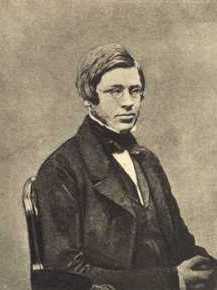Alfred Russel Wallace
In the early 21st century, as well as in the previous century, many biologists have argued for a more informed and celebrated acknowledgement of the contributions to our understanding of evolution by the 19th century British naturalist and contemporary of Charles Darwin (b February 12, 1809; d. April 19, 1882), Alfred Russel Wallace (b. January 8, 1823; d. November 7, 1913).
Like Darwin, Wallace, 14 years Darwin's junior, possessed a passionate and inveterate desire to observe the natural world of plants and animals, both at home and in the unexplored wilds of the world. Also like Darwin, inspired by the economist, Thomas Malthus (1766-1834) and Malthus's ideas about the limits of population growth due to the limits of growth-supporting resources, came to the conclusion that nature selected for reproductive success those individuals of an interbreeding population with heritable traits enabling them to best cope with a changing environment threatening their ability to generate progeny — natural selection, or 'survival of the fittest'. Wallace developed the idea independently of Darwin, though not before Darwin had worked out the idea in great detail but before Darwin had published it.
In a speech by the eminent British evolutionary biologist, Richard Dawkins FRS, given November 26th, 2001, for the unveiling of a plaque in the Royal Academy commemorating the concurrent reading of the Darwin’s and Wallace’s papers describing natural selection at England’s Linnean Society, July 1st 1858, Dawkins stated:
Not only is it [natural selection] the all-but universally accepted explanation for all the complexity and elegance of life. It is also, I strongly suspect, the only explanation that in principle could provide that explanation. But Darwin was not the only person who thought of the idea. When Professor [Daniel] Dennett and I made our remarks, we were — certainly in my case and I suspect that Dennett would agree — using the name Darwin to stand for “Darwin and Wallace”. This happens to Wallace quite often, I am afraid. He tends to get a poor deal at the hands of posterity, partly through his own generous nature. It was Wallace himself who coined the word ‘Darwinism’, he regularly referred to it as Darwin’s theory and he referred to himself as ‘more Darwinian than Darwin’. The reason we know Darwin’s name more than Wallace’s is that Darwin went on, a year later, to publish the Origin of Species. The Origin not only explained and advocated the Darwin/Wallace theory of natural selection as the mechanism of evolution. It also – and this had to be done at book length – set out the multifarious evidence for the fact of evolution itself.”
Nevertheless, Wallace and Darwin had different perspectives on natural selection and the mechanisms of evolution, which this article will in part explore.
Wallace's early life
We know a little of Wallace's early circumstances from his autobiography.[1]
References and Notes Cited in Text
- ↑ Wallace AR. (1905) My life: A record of events and opinions. London: Chapman and Hall. Volume 1. Full-Text in Image Format, from: The Complete Works of Charles Darwin Online, The Freeman Bibliographical Database
